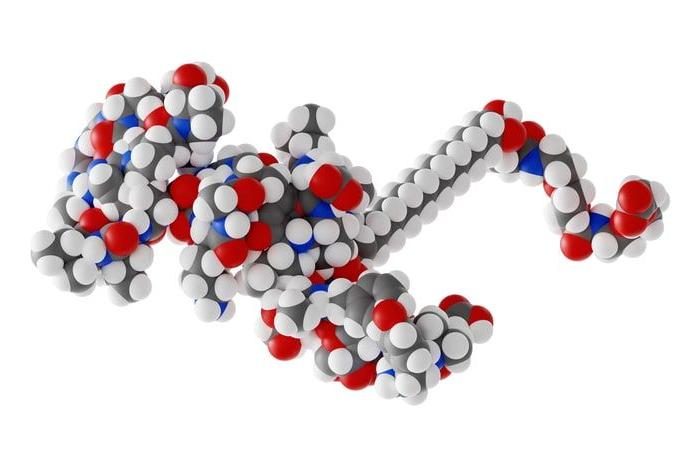Orlando, United States – The diabetes and weight-loss drug tirzepatide (Mounjaro for type 2 diabetes, Zepbound for obesity) was so effective in reducing sleep disturbances in patients with obesity and obstructive sleep apnea (OSA) that 40 to 50 percent of them no longer needed to use a continuous airway pressure (CPAP) machine, according to two new studies.
The two double-blind randomized controlled trials in patients with obesity and moderate-to-severe OSA were conducted at 60 sites in nine countries. The results were presented at the 84e scientific session of theAmerican Diabetes Association (ADA) and published simultaneously online in the New England Journal of Medicine .
Tirzepatide, a glucose-dependent insulinotropic polypeptide (GIP) receptor agonist glucose-dependent insulinotropic polypeptide) and glucagon-like peptide-1 receptors (glucagon-like peptide 1, long-acting GLP-1), also lowered C-reactive protein levels and systolic blood pressure. Patients taking this medication lost 18-20% of their body weight.
The studies SURMOUNT-OSA “mark an important milestone in the treatment of OSA, providing a promising new therapeutic option that addresses both respiratory and metabolic complications,” said the lead author Atul Malhotraprofessor of medicine at the University of California San Diego School of Medicine and director of sleep medicine at UC San Diego Health.
OSA affects 1 billion people worldwide, many of whom go undiagnosed. Obesity is a common risk factor. According to the ADA, 40% of obese people have OSA and 70% of people with OSA are obese.
CPAP is an effective and most commonly used intervention for OSA, but many patients refuse to use the device, stop using it, or cannot use it. If tirzepatide is ultimately approved by the Food and Drug Administration (FDA) of the United States for OSA, it will be the first drug approved for this condition.
“This new drug treatment offers a more accessible alternative to people who do not tolerate or adhere to existing therapies,” said Professor Malhotra.
Significant reduction in episodes and severity
Both studies included patients with moderate to severe OSA, defined as more than 15 episodes per hour (according to the apnea-hypopnea index [IAH]) and a body mass index equal to or greater than 30 kg/m2. People not using a CPAP device were included in study 1, those using a CPAP device were included in study 2.
Participants received either the maximum tolerated dose of tirzepatide (10 or 15 mg by injection once weekly) or placebo for one year. In Study 1, 114 participants received tirzepatide and 120 received placebo. In Study 2, 119 patients received tirzepatide and 114 received placebo. All participants received regular nutritional counseling sessions and were encouraged to reduce their dietary intake by 500 kcal/day and to exercise for at least 150 minutes per week.
The number of participants was limited to 70% men to ensure adequate representation of women.
At baseline, 65-70% of participants had severe OSA, with more than 30 AHI events/hour and an average of 51.5 events/hour.
After one year, patients treated with tirzepatide had 27 to 30 fewer events/hour, compared with 4 to 6 fewer events/hour for patients taking placebo.
Nearly half of the patients who received tirzepatide in both trials had fewer than 5 events/hour or 5 to 14 AHI events/hour and an Epworth Sleepiness Scale score less than or equal to 10. These Thresholds “represent a level at which CPAP treatment may not be recommended,” the authors write.
Patients in the tirzepatide group also experienced a decrease in systolic blood pressure from baseline of 9.7 mmHg in Study 1 and 7.6 mmHg in Study 2 at week 48.
The most common adverse reactions were diarrhea, nausea, and vomiting, which occurred in about a quarter of patients receiving tirzepatide. Two cases of acute pancreatitis were confirmed in patients treated with tirzepatide in Study 2.
Tirzepatide-treated patients also reported fewer daytime and nighttime disturbances, measured using the Simplified Patient-Reported Outcomes Measurement Information System Scale for Sleep-Related Disorders and Sleep Disturbances. sleep (Patient-Reported Outcomes Measurement Information System Short Form scale for Sleep-Related Impairment and Sleep Disturbance).
Tirzepatide and CPAP are the best treatments
In an editorial, the Dr Sanjay R. Patel (USA) notes that although clinical guidelines recommend incorporating weight loss strategies into the treatment of OSA, “integration of obesity management into approaches to care for obstructive sleep apnea has lagged.”
Up to half of patients drop out of CPAP therapy within three years, says Dr. Patel, who is a professor of medicine and epidemiology at the University of Pittsburgh and medical director of the UPMC Comprehensive Sleep Disorders Program. “An effective drug to treat obesity is therefore an obvious path forward,” he writes.
Dr. Patel also highlights the significant reductions in the number of AHI events. He writes that the improvement in systolic blood pressure “was significantly greater than the effects observed with CPAP treatment alone and indicates that tirzepatide may be an attractive option for patients seeking to reduce their cardiovascular risk.”
Dr. Patel also questions whether outside of clinical trials, in real life, patients would continue to take treatment, noting that studies have shown high rates of discontinuation of GLP-1 receptor agonists.
Commenting on the study during the presentation of the results, the Dr. Louis Aronne, professor of metabolic research at Weill Cornell Medical College (New York) said he believes clinical trials demonstrate that “treatment of obesity with tirzepatide plus CPAP is truly the optimal treatment for obstructive sleep apnea.” and cardiometabolic risks linked to obesity.
Dr. Aronne adds that there is still much to learn on the subject. It remains unclear whether tirzepatide had an independent effect in the obstructive sleep apnea study – as seen in other studies where tirzepatide clearly reduced cardiovascular risk – or whether the results Positive results were mainly due to weight loss.
“I think over time we will see that this particular effect on sleep apnea is related to weight,” he said.
Funding and links of interest
The study was funded by Eli Lilly. Dr. Malhotra said he is a paid consultant to Lilly and ZOLL Medical and a co-founder of Healcisio.
This article was translated from Medscape.com using multiple editorial tools, including AI, in the process. The content was reviewed by the editorial staff before publication.






